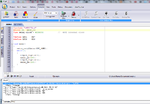Papizo
Junior Member level 1

Hi guys am doing this project Vehicle security system with theft control and Accident Notification so before I start anything I want to test my PIC16F877A if is going to work with CCS C, so I want to test my 2 LED blinking I have found program online which will work but is not working at all
main.c
so when am trying to compile getting this error
So what is the problem with my code? can you show me where I have done wrong please...
main.c
Code C - [expand]
so when am trying to compile getting this error
Clean: Deleting intermediary and output files.
Clean: Done.
Executing: "C:\Program Files (x86)\PICC\Ccsc.exe" "main.c" +FM +DF +LN +T -A +M +Z +Y=9 +EA
*** Error 17 "C:\Users\User\Desktop\mplab\htc.h" Line 4(10,11): Too many nested #INCLUDEs
1 Errors, 0 Warnings.
Halting build on first failure as requested.
BUILD FAILED: Fri Oct 26 14:26:32 2012
So what is the problem with my code? can you show me where I have done wrong please...
Last edited by a moderator:



